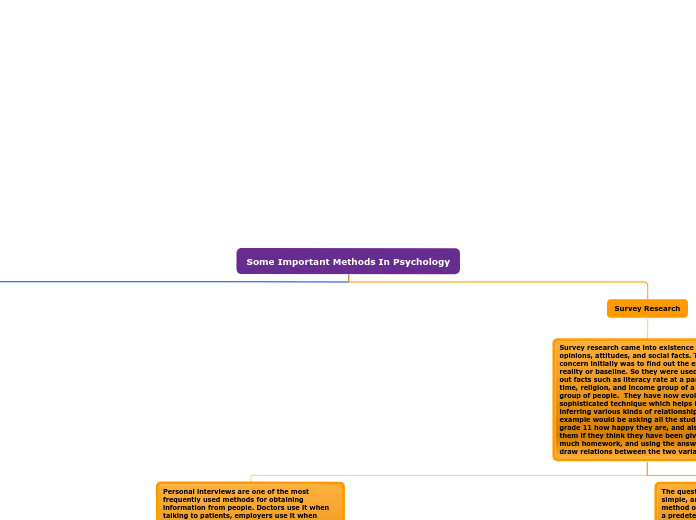Some Important Methods In Psychology
Survey Research
Survey research came into existence to study opinions, attitudes, and social facts. Their main concern initially was to find out the existing reality or baseline. So they were used to find out facts such as literacy rate at a particular time, religion, and income group of a particular group of people. They have now evolved into a sophisticated technique which helps in inferring various kinds of relationships. An example would be asking all the students of grade 11 how happy they are, and also asking them if they think they have been given too much homework, and using the answers to draw relations between the two variables.
The survey method has several advantages. First, information can be gathered quickly and effectively. Second, public opinions on new issues can be obtained almost as soon as the issues arise because of how quickly surveys can be conducted. Surveys have some limitations too. First, people may give inaccurate information because of memory lapses or they may not want to let the researcher know what they really believe about a particular issue. Second, people sometimes offer responses they think the researcher wants to hear, and not their true actual opinion.
Telephone surveys are surveys conducted through the telephone. This survey helps in reducing time but since the respondents do not know the interviewer, the technique is fraught with uncooperativeness, reluctance, and superficial answers by the respondents. Telephone surveys can also lead to very biased results depending on who is answering.
The questionnaire survey is the most common, simple, and versatile and low cost self report method of collecting information. It consists of a predetermined set of questions. The respondent has to read the questions and mark the answers on paper rather than respond verbally to the interviewer. The questionnaire is used for collecting background and demographic information. Information about past behaviour, attitudes and opinions. Two types of questions are asked in the questionnaire.
Closed ended questions where the questions and their probable answers are given and the respondent is required to select the correct answer.
Open ended questions where the respondent is free to write whatever answer they consider appropriate.
Personal interviews are one of the most frequently used methods for obtaining information from people. Doctors use it when talking to patients, employers use it when hiring someone new to work for them, etc. We even see these kind of interviews on live television. The interviewer usually asks some questions to the interviewee face to face which they have to answer. Interviewing is a skill which needs proper training. A good interviewer makes the respondent at ease, and get the optimal answer. The interview method obtains in depth information and is flexible and adaptable to the situation. It can be used with different kinds of people. However, interviews are extremely time consuming and thus can be cost effective.
An interview can have the following combinations of participants in an interview situation. Individual to individual. Individual to group. Group to individuals. Group to group
Interviews can be unstructured/ non-standardised meaning that the interviewer has the flexibility to take decisions about the questions to be asked, the wording of the questions, and the sequence in which the questions are to be asked.
Interviews can be structured/standardised meaning that the questions asked in the interview are written clearly in a particular sequence. The interviewer has little to no freedom to make changes in the wordings of the questions or the order in which they are asked.
Correlational research
In psychological research we often wish to determine the relationship between two variables for prediction purposes. For example, whether or not more hours of study bring about better and improved grades. This method is different from experimental method in the fact that here you do not manipulate the amount of studying and examine its impact on achievement. Rather, you simply find out the relationship between the two variables to determine whether or not they are associated. The strength and direction of the relationship between two variables is represented by a number, known as correlation coefficient. Its value can range from +1.0 through 0.0 to -1.0
It is also possible that sometimes, no correlation may exist between the two variables. This is called zero correlation. It is difficult to find zero correlation but the correlations may be found closer to zero like 0.02 or 0.04, and this indicates that no significant relationship exists between the two variables.
A negative correlation indicates that as the value of one variable X increases, the value of the other variable Y decreases. Similarly, as the value of variable X decreases, the value of variable Y increases. Suppose the more homework students have, the less likely they are to being happy. And the less homework they have, the more likely they are to being happy. This type of association will be indicated by a negative number, and the stronger the association, the closer the number would be to -1.0.
A positive correlation indicates that as the value of one variable X increases, the value of the other variable Y will also increase. Similarly, when variable X decreases, variable Y decreases as well. Suppose the more time students studied, the higher they scored on their exams, and the less time the students studied, the lower they scored. This type of association will be indicated by a positive number, and the stronger the association, the closer the number would be to +1.0.

